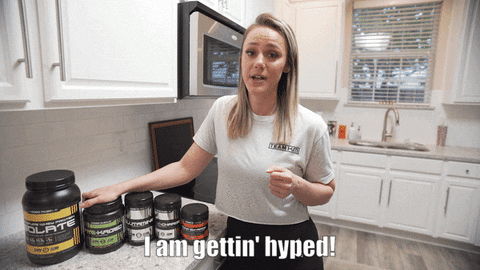The Wellness Maze
I used to scroll past wellness trends without a second thought—until I started seeing the same promises everywhere… Everywhere I looked, the wellness industry was promising solutions to problems I didn’t even know I had. From “adrenal fatigue” to “toxic overload,” new wellness buzzwords popped up every day, each one linked to a product, a supplement, or a lifestyle change I apparently needed. But was any of it real? And if so, how much of it actually made a difference? how much of this was backed by science, and how much was just clever sales tactics?
Fueled by curiosity, I immersed myself in research.
What I found was clear: confusion isn’t just a byproduct of the wellness industry—it’s a business model. The more uncertain we feel about our health, the more products we buy. So, let’s break down the hype, separate fact from fiction, and talk about what actually matters.
💡 Things to take with you
The wellness industry deliberately presents contradictory dietary advice (e.g., low-carb vs. high-carb diets) to keep consumers searching for the "right" answer.
People overwhelmed with information are more likely to make impulsive purchases.
Mayo Clinic experts warn that "superfood" is a marketing term rather than a scientific classification.
While some nutrient-dense foods offer health benefits, no single food can replace a balanced diet, yet marketing convinces consumers otherwise.
The detox industry continues to thrive, profiting from fear-driven misinformation
Wellness was never meant to be overwhelming. It’s not a mystery to solve or a marketing funnel to fall into. It’s about tuning out the noise and tuning into what’s real, sustainable, and actually supportive. In this post, we’ll decode the buzziest wellness terms, spotlight what’s backed by science and what’s just smart selling.


The Science (or Lack Thereof) Behind Wellness Trends
A major issue with the wellness industry is its reliance on pseudoscience.
A 2021 study published in JAMA Network Open found that 40% of health-related social media content contained misleading or inaccurate claims.
⚠️ From detox teas to biohacking gadgets, many popular products lack robust clinical evidence.
❗️Instead, they rely on anecdotal testimonials and celebrity endorsements rather than peer-reviewed research.
The dietary supplement market alone, worth over $150 billion, is rife with misleading claims.
⚠️ The FDA does not require pre-market approval for supplements, allowing companies to promote products with vague statements like “supports immune function” without proving effectiveness.
A review in The New England Journal of Medicine found that over 23,000 emergency room visits annually are linked to dietary supplements, mostly due to unregulated ingredients and misleading usage recommendations
Recent analyses continue to highlight these issues!
A 2024 article from Business Insider discusses common myths about supplements, emphasizing that excessive intake can be harmful and that supplements should not be considered cure-alls but rather as complements to a healthy diet.
Stefan Pasiakos, head of the Office of Dietary Supplements at the National Institutes of Health, advocates for a food-first approach to health, utilizing supplements only to enhance nutritional balance. However, he also notes:
"If you don't know what a person is eating and getting from their diet nutrient-wise, you can't advise them on what dietary supplements they should take. Without a clear understanding of individual nutritional intake, supplement use can be misguided at best and potentially harmful at worst. This underscores why informed, evidence-based guidance is crucial before adding any supplement to your daily routine."


Additionally, a 2025 article from The Guardian questions the efficacy and regulation of hormone supplements marketed to perimenopausal and menopausal women.
The article highlights that many health claims associated with these supplements are poorly substantiated or untested, and experts suggest that placebo effects are powerful, but evidence supporting the efficacy of these supplements is minimal.
Professor Susan Davis, a consultant endocrinologist, sex hormone clinical researcher and head of Monash University’s women’s health research programme, says:
”The only people who should be taking supplements are people with malabsorption or nutritional deficiencies.”
This example illustrates how the wellness industry often capitalizes on the healthcare void for middle-aged women, promoting products with minimal scientific backing.
✦ Many wellness products rely on testimonials and celebrity endorsements instead of peer-reviewed research.
✦ No pre-market approval is required, leading to vague and misleading health claims (e.g., “supports immune function”)
✦ NIH Office of Dietary Supplements reinforces a food-first approach, warning against uninformed supplement use
✦ The efficacy of hormone supplements marketed to menopausal women remains questionable, as their benefits are often unproven and may largely rely on placebo effects
The wellness industry isn’t about giving you answers—it’s about keeping you searching. Misinformation, conflicting advice, and fear-based marketing aren’t accidents—they’re strategies.
The reality?
Science-backed health advice is usually simple, boring, and not nearly as profitable.


Confusion = More Sales
The wellness industry thrives on consumer uncertainty.
By presenting conflicting information—one diet trend demonizes carbs, another glorifies them—the industry keeps consumers searching for new solutions. Each new “breakthrough” creates demand for the latest product or program, whether it’s keto, intermittent fasting, or adaptogenic mushrooms.
A study in the Journal of Consumer Research found that people experiencing information overload are more likely to make impulsive purchasing decisions.
This means that confusion directly translates to profit.
When you’re unsure about what’s truly good for your health, you’re more likely to experiment with new, often expensive, solutions.
Moreover, a 2024 study published in JAMA Network Open examined the impact of sponsored content on users' decision-making in online health searches.
🔎 The researchers found that indirect marketing advertisements, which explicitly advocate a product's effectiveness, significantly influence users' perceptions and can lead to more positive viewpoints about the product.
This suggests that the strategic placement of persuasive content amidst conflicting information can sway consumer behavior, prompting them to make purchases they might otherwise avoid.
For instance, the proliferation of detox diets and cleanses often lacks scientific backing.
🔎 Health experts from Johns Hopkins Medicine emphasize that our bodies are naturally equipped to eliminate toxins without the need for special diets or expensive supplements. Despite this, the detox industry continues to grow, capitalizing on consumer confusion and desire for quick fixes.
Similarly, the promotion of superfoods as cure-alls can be misleading. While foods like acai berries and chia seeds are nutritious, the Mayo Clinic points out that no single food can offer all the health benefits that some claims suggest:
”Sometimes food marketing can be very misleading for consumers. For example, you can put a sticker on a box that says ‘whole grain,’ and it is made with whole grain. But it doesn’t mean it’s any more than 1% whole grain. There is no regulation around superfoods, whereas there is regulation about other words having to do with foods such as the word ‘organic.’” — Tara M. Schmidt, M.Ed., RDN, LD Mayo Clinic expert
Yet, marketing these superfoods as essential additions to one's diet drives sales and perpetuates the cycle of consumer uncertainty.
In essence, the wellness industry often profits from the very confusion it creates, urging consumers to seek out and purchase the latest health trends without substantial evidence of their efficacy.
How to Spot the Hype
With so much wellness advice floating around, it’s easy to get swept up in big claims and beautifully packaged promises. But not everything that looks healthy is backed by real science — and not every headline tells the whole truth.
🔎 Key insights
Check the Source
Reliable information comes from peer-reviewed journals, not influencer posts or brand-sponsored studies. Look for research from sources like WebMD, PubMed, JAMA Network, The New England Journal of Medicine, etc.
Look for Clinical Trials
If a wellness claim is legitimate, there should be published, large-scale clinical studies backing it up. Check databases like ClinicalTrials.gov or research reviews from Cochrane Library.
Beware of Miracle Claims
If something sounds too good to be true (e.g., “this supplement will burn fat while you sleep”), it probably is. Harvard Health warns against extreme health promises that lack scientific validation.
Follow the Money
Who benefits from the claim? If a product is pushing a narrative, question its validity. Investigate whether a study was funded by the same company selling the product.
Understand Regulatory Gaps
Unlike prescription drugs, supplements are not always FDA-approved before hitting the market. Check FDA.gov or CDC.gov for safety alerts and recalls.
Consider Expert Consensus
Look for statements from reputable health organizations such as the Mayo Clinic, or Johns Hopkins Medicine, which rely on rigorous evidence-based research
Read Beyond the Headlines
Sensationalized media coverage can distort findings. Always read the full study or consult trusted medical sources like Healthline or NHS UK for a balanced perspective.
In short, spotting wellness hype comes down to asking the right questions, checking credible sources, and staying mindful of who's behind the message. With a little critical thinking, it's easier to filter out the noise and focus on information that’s grounded, trustworthy, and actually helpful.


Think Critically About Wellness Claims
The wellness industry thrives on uncertainty, and that’s exactly what keeps it profitable.
It sells problems you didn’t know you had and offers solutions you might not actually need. The reality? True wellness isn’t found in an overpriced supplement or the latest superfood trend—it’s in sustainable, science-backed habits.
So next time you’re tempted by a miracle product or a fear-driven marketing claim, pause…
Ask yourself:
Who benefits from this?
What does the real science say?
Do I actually need this?
Real health isn’t about chasing trends — it’s about making informed, intentional choices that truly serve you.
The wellness industry isn’t going anywhere, and there’s nothing wrong with prioritizing your health.
However, being an informed consumer is key to avoiding scams and unnecessary expenses. The research is clear: confusion sells, fear manipulates, and science is often an afterthought.
By questioning the hype, checking the science, and recognizing fear-based marketing tactics, you can make better choices for your well-being—without falling for industry-driven confusion.
--
Disclaimer: The information provided on the blog is for general informational and educational purposes only and is not a substitute for professional medical advice, diagnosis, or treatment. Consult with a qualified healthcare provider before making any health-related decisions


